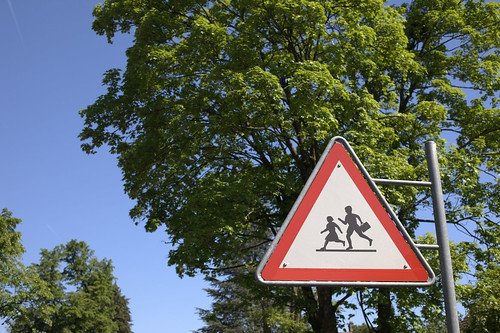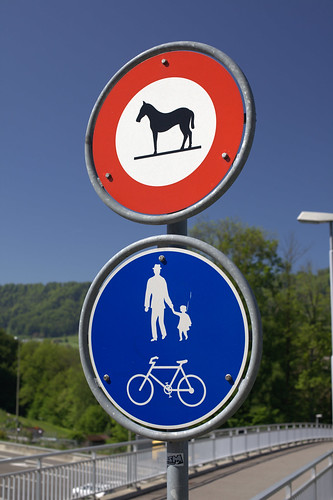Guest Post by
Kathy from
TwoFools in Zurich Blog
I love studying languages. Some people collect stamps, some build model trains. I study languages. I have even put this down as a hobby on my resume, in a joking, self-deprecating way. I studied Russian, French, Spanish, and Latin in (American) public schools. Slightly extending the gap year(s) before university meant starting over with Spanish and Russian. In the past five years, I've started studying French again, took some Italian classes. And now German.
You might think, How wonderful to speak so many languages! I think so too and wish I did. I made it to a reasonable level of fluency only with Russian (what with that being the language of my field of study in grad school I pretty much had to).
And now German. Here I am in the
Alemannic world with my love of language study, lots of free time and a desperate need to communicate outside of my cozy little anglophone world. I am in charge of household stuff, and that means using German with movers, repairmen, shopkeepers, dry cleaners, receptionists, Kreis officials, and so on. But more than this, here is my chance to really, finally become fluent in another language. I am feeling very motivated.
Ready, set, go. A few weeks after arriving I started intensive classes at a nearby school (starts with L, ends with I). At first I was a little dismayed. This was clearly the instructor's day job, a little too beneath him to be troubled to learn to be a teacher. Or perhaps he just lacked the gift. No matter, he was just filling in for the regular instructor. Also, the core group of students was a particularly congenial and motivated group of English speakers.
The regular instructor was amazing. He was able to seamlessly introduce the new vocabulary into whatever topic he was covering so that our listening comprehension really grew along with the necessary but tedious effort of memorizing new words. He was great at grammar explanation, relentless in making the students speak in class. So what if the school kept dumping additional students with varying levels of ability into the class, sometimes exceeding the maximum number of students specified in their promotional literature. So what if the the construction site outside made it a little hard to hear with the window open. The teacher was gifted and the core group motivated. I learned a lot in those first two months, and really felt I was on that first upward curve of a learning peak.
Language learning is not a straight-line process, even if classes are. There are peaks and valleys and plateaus. Being on the rising curve of a peak is one of the most exciting and rewarding parts of language learning. Suddenly you're reading an article in the paper. Without realizing it, you've gotten into conversation and you
understand what the other person is saying. Wow. And there is always another peak ahead. That makes it a little easier to take the plateaus and valleys.
I'm in a valley now. Here's what happened. I had to go back home for a month for a family medical emergency. (I should say here that I am very grateful that I was able to do this and am happy to report all is well at home now.) I came back to the same class but was hopelessly behind. After a few days I asked to be moved to another class that had just started an earlier the chapter.
Like the first temporary instructor and one other substitute teacher we'd had for my first class, this instructor was just useless at grammar explanation and not at all in charge of the class. In her defense, the students were quite a lot to handle. A princeling from some small oil-producing kingdom, a sulky Columbian Lolita, a high-energy Brazilian woman who enjoyed taunting the princeling into rages, two Turks mostly in their own world. They were all young, loud, and entitled. They also all shared an amazingly poor grasp of the vocabulary and grammar, making it almost impossible to get any benefit from the class. I got out.
A month (mostly) of travel and now home in Zürich a month, I have already forgotten some vocabulary and barely made a start on moving ahead on grammar on my own. Unlike some
others, I lack the iron self-discipline it takes to study language on my own, at least not in the beginning stages. I need the structure of a class to keep me going.
I already knew this about myself of course. We factored the cost of classes into the "What will it take to move to Switzerland?" planning. (My husband gets some free classes and some others reimbursed through his job. Lucky sod.)
So now the search for a new school starts again. Rather than just picking a place a random, which I did last time, I'm trying to be little smarter this time. There are a lot of language schools in Zürich, ranging from the
Kantonal school to
Migros Klubschule to dozens of pricier choices. (I found a pretty useful list
here.) The competition hasn't really done much to ensure quality and it varies pretty widely. Apparently, schools here stay in the black by paying low wages to teachers and by continually slotting new students into open classes. (Schools in my home town don't do this, but they're going broke now.)
My new search rules.
Know what you want in a school and try to find one that fits your criteria. Small classes? Professional teachers? Close to your house? Cost?
Ask for advice and opinions about quality of schools. One school has been pretty frequently criticized by friends and in online forums, so I'm passing on that one.
A school should offer you the opportunity to at least sit in on a couple of classes at no charge before registering.
Make sure you understand the fees and refunds offered in case of cancellation (yours and the school's) and closures. My previous school canceled a class for a week because "too few students" were able to attend. They didn't offer a refund and only offered make up classes when pressed for this. They also didn't offer refunds or make up classes for holiday closures.If the school has promised a benefit it doesn't deliver, complain to the Chef (director). My previous school offered excursions as an included benefit, but these somehow never happened.
To get a sense of what's out there in terms of quality, I checked out
English Forum threads on language schools. Next I started eliminating schools that are too far away (that ruled out two lower priced options: Migros and EB Zürich). I also called and did a phone screening at a few places. I got a pretty negative vibe off of
Alemania and a good one from
Bellingua.
Bellingua offers a 2-week, money-back trial period and promises lots of other good stuff. I'm going Monday for my assessment test and to get started on my free trial. I'm pretty excited about it.
So excited in fact that I've pulled out all my study aids. Study aids are essential part of a language-study hobby, of course, ensuring that the maximum dollars are spent to ensure the osmotic language learning process is fully engaged. I have grammar books, text books, self-teaching books and CDs, dictionaries, vocabulary builders, and on and on.
But my favorite study aid is actually free (if you don't count the cost of the phone). It's an iPhone/Blackberry app called
gFlash. Instead of making all those flashcards, hundreds of them, just create spreadsheets in Google docs and then upload them to the app on your phone. Bingo, presto. The sheets are formatted into flash cards. You also get nifty quizzes that help motivate you to get through yet another vocab list.
That's the thing, of course. In the end, you have to commit lots of words to memory and learn the grammar. You have to listen and speak and read. The classes and study aids are really just a good way to trick yourself into doing this hard work. Never surrender, never give up.
To read more from Kathy, visit her Blog, TwoFools in Zurich.











